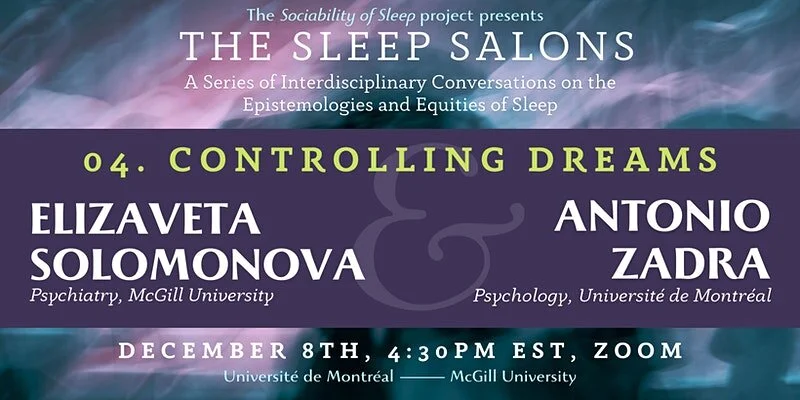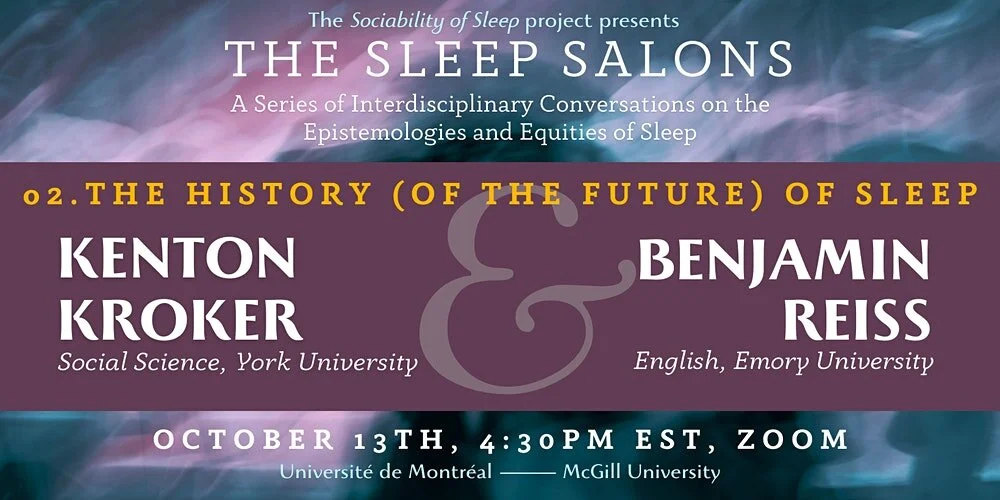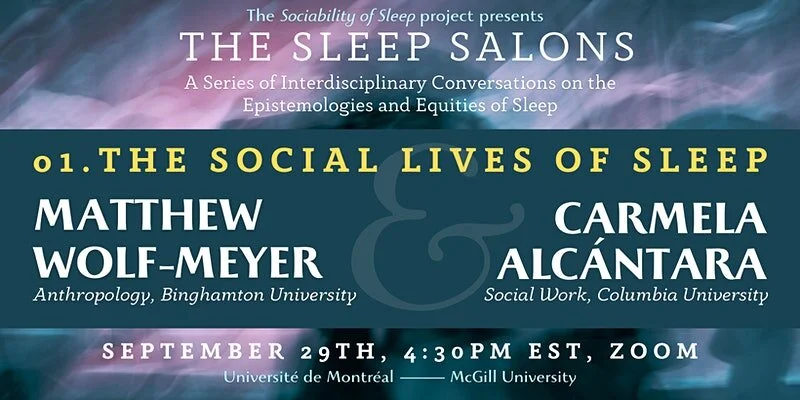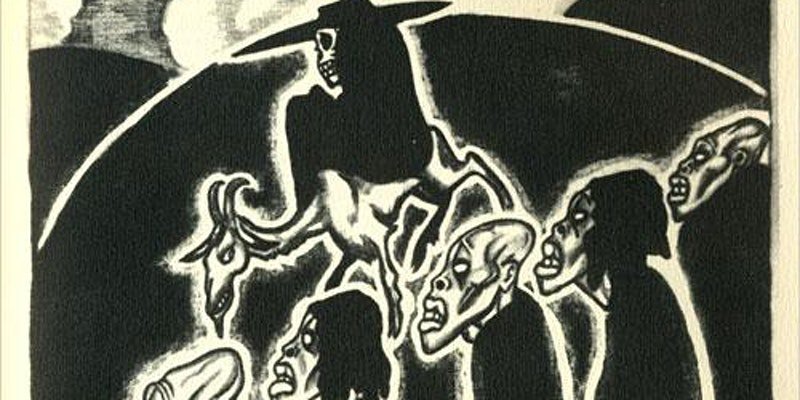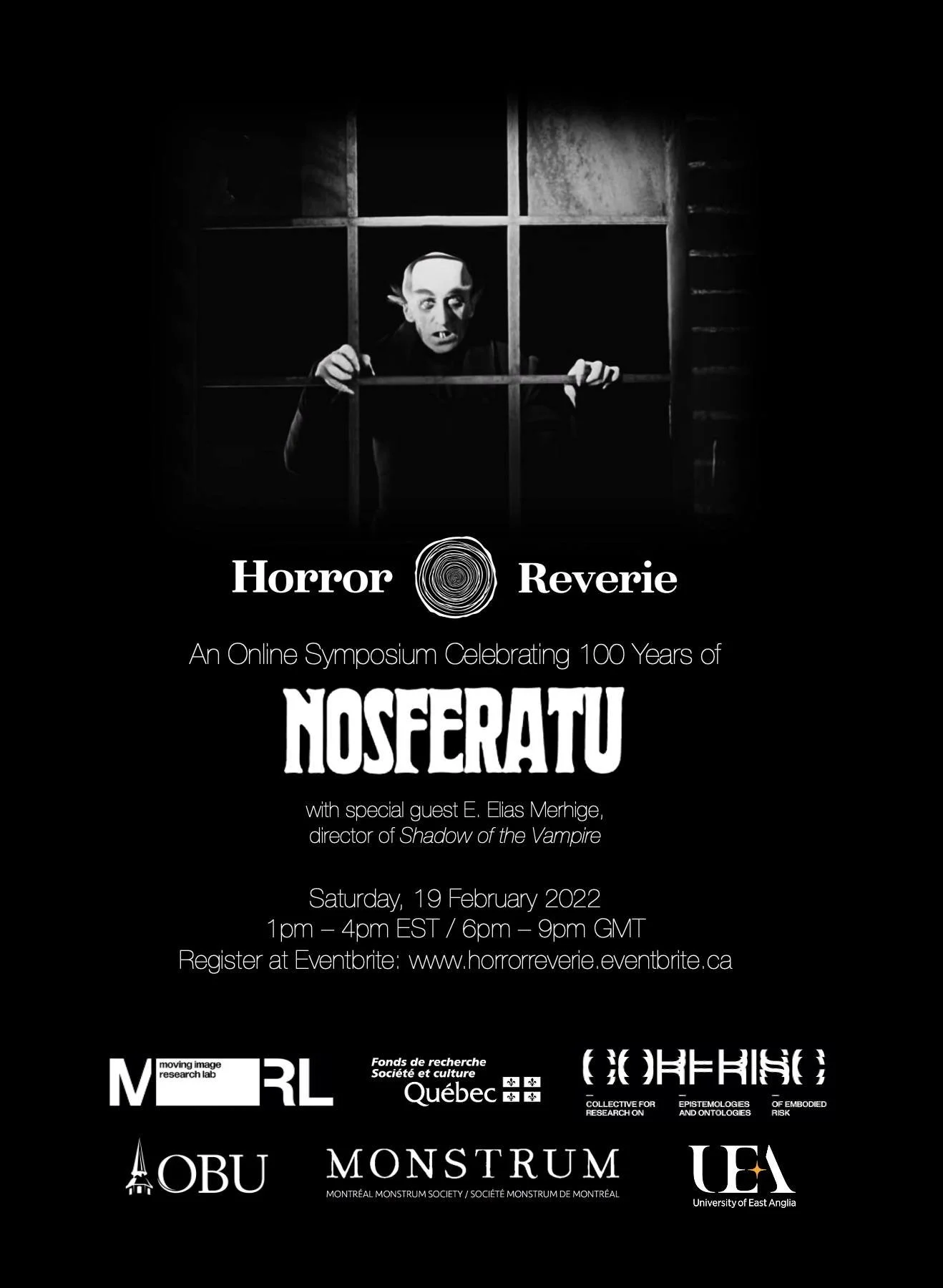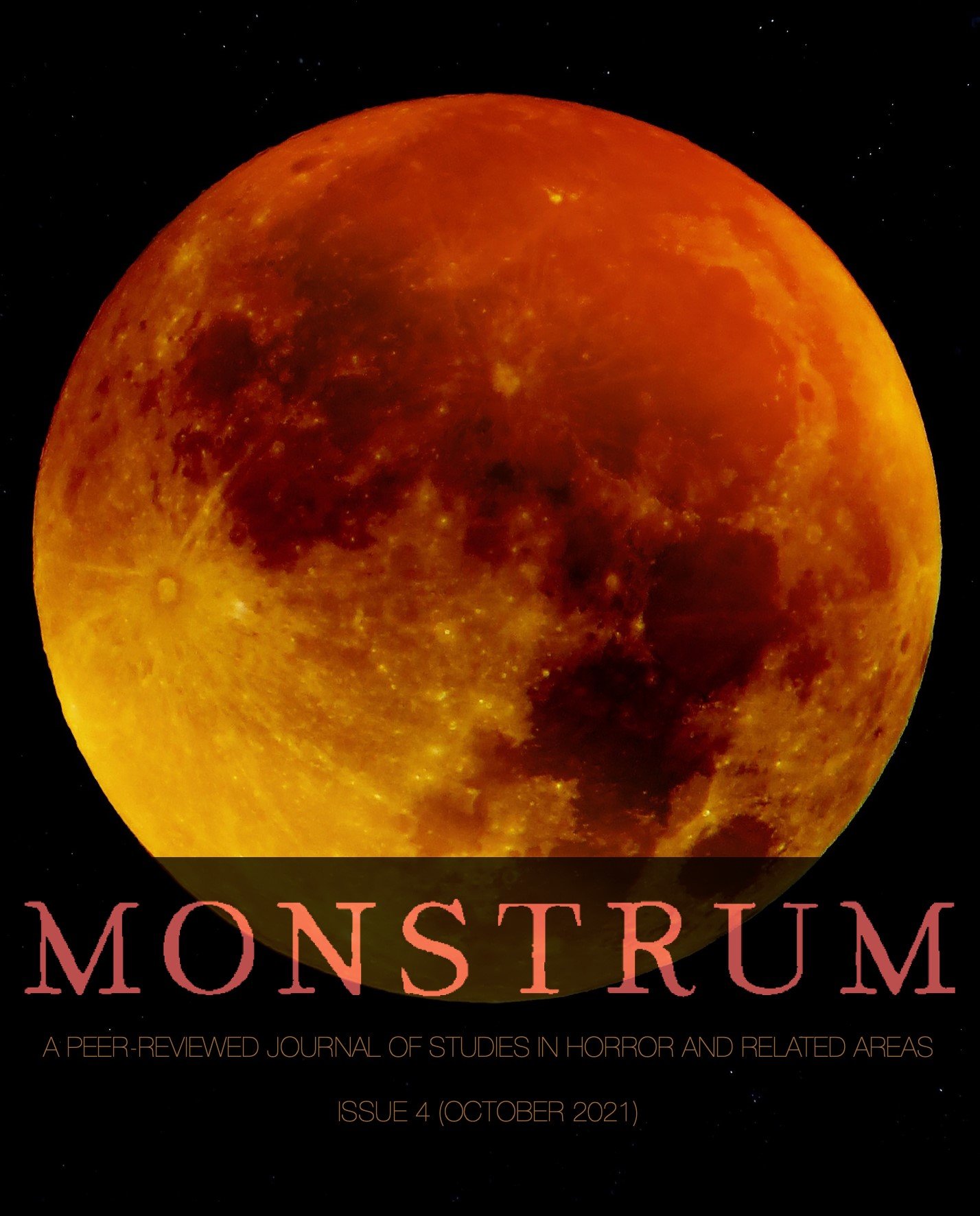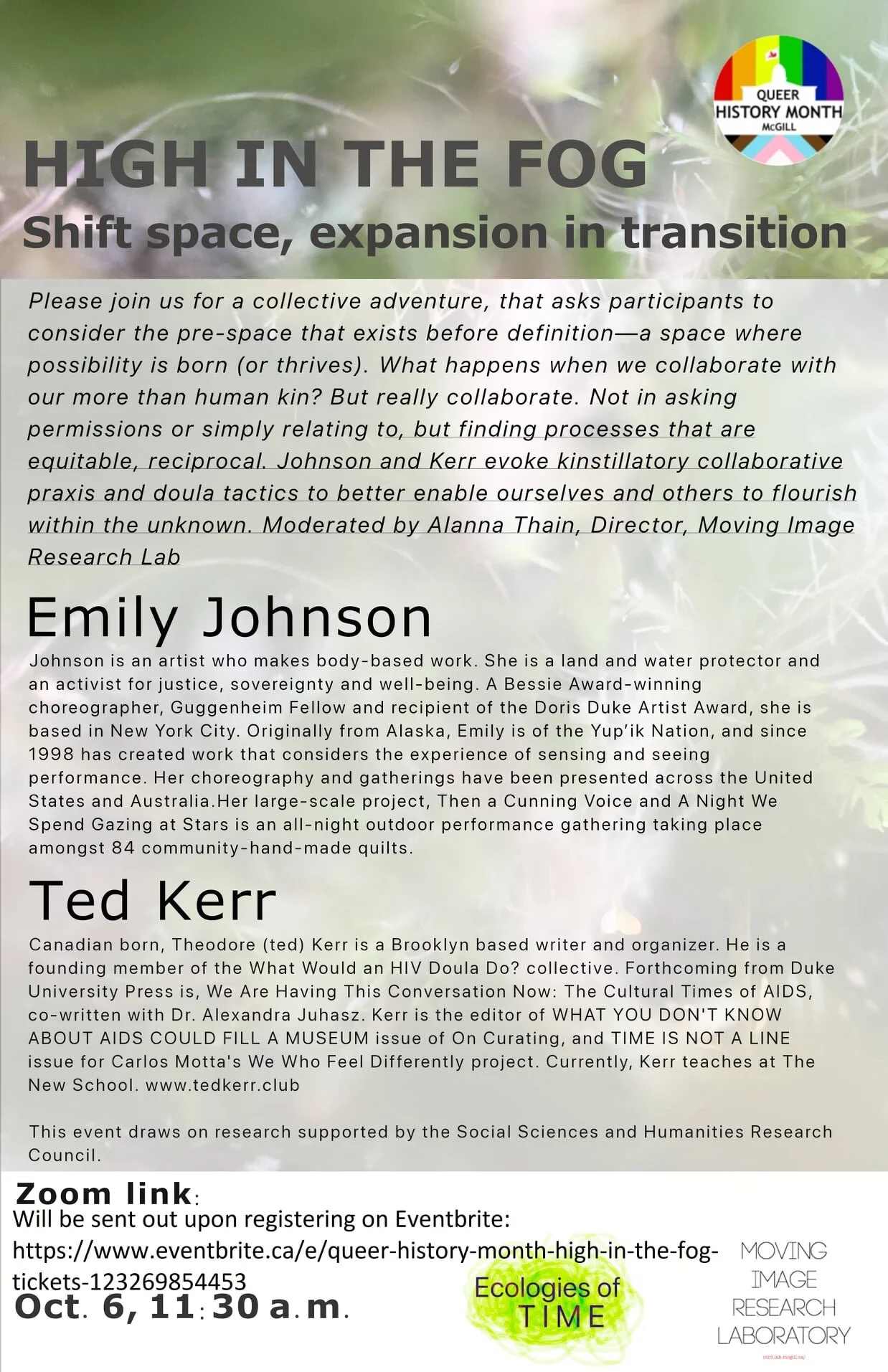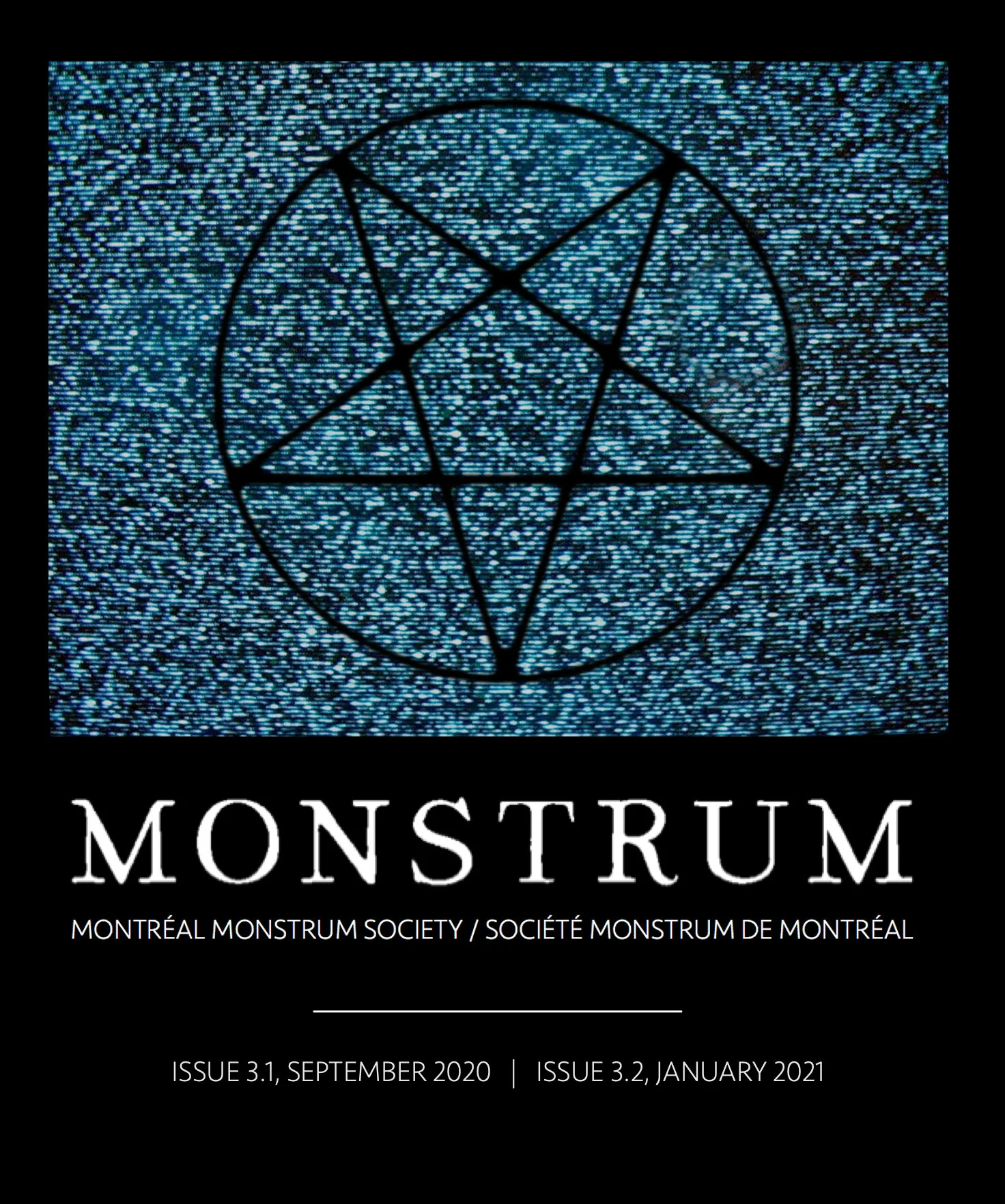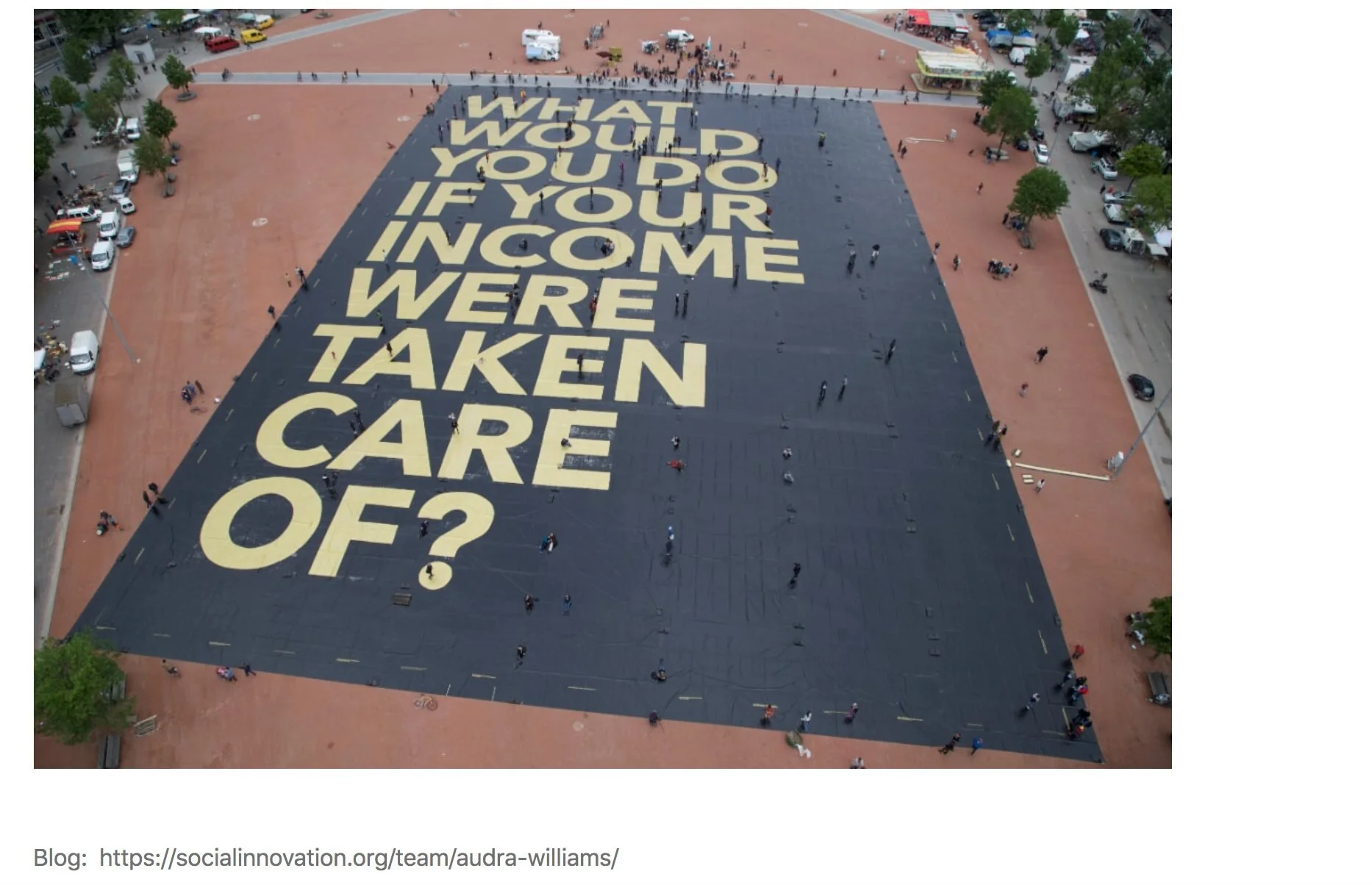Upcoming

PHIXSOSXDSC HOW TO STAY SLEEPY
What happens in the aftermath of infinity? The Sociability of Sleep is collaborating with the Fondation Phi’s exhibition Yayoi Kusama: DANCING LIGHTS THAT FLEW UP TO THE UNIVERSE and doux soft club’s bleu de lieu participatory installation for a day long exploration of this question: How to Stay Sleepy?
Again and again, we have encountered images of Kusama resting and sleeping in the world of her own work. For everyone, sleep is an everynight practice of meeting the edge of experience, in which we are all experts and always beginning again. Through her art, her techniques of repetition, and her explorations at the edge of the perceptual, the sensible and the real, Kusama provokes that threshold feeling of the fall into sleep, when the world shifts around us and anything becomes possible. Much of her work and her life has explored the question of how to make such experiences of intensity and uncertainty both liveable and shareable.
In How to Stay Sleepy, visitors will be invited to experiment with their own experiences at the edge of sleep, the hypnagogic state and the remix of dreams, imagination and the everyday. Guided by SoS’s team of expert artists, sleep scientists and fellow sleepers, we invite you to extend the edge of infinity as you step out of Kusama’s world. You choose how you wish to take part: through the Kusama sleep questionnaire, by recording your sleep rests and remixing the onsite soundscape, by napping alongside the action, opening up the infinite angles of sleep.
This work is made possible in part by the New Frontiers in Research Fund and the Social Sciences and Humanities Research Council of Canada
Foundation Phi, Montréal,
465 Saint-Jean Street, Education Room (SS01)
Free · Reservations required
To participate in the “How to Stay Sleepy” event, please reserve a spot by contacting Daniel Fiset at dfiset@phi.ca.
The experience will also be accessible to people who have tickets to visit the Yayoi Kusama exhibition on December 10, 2022.
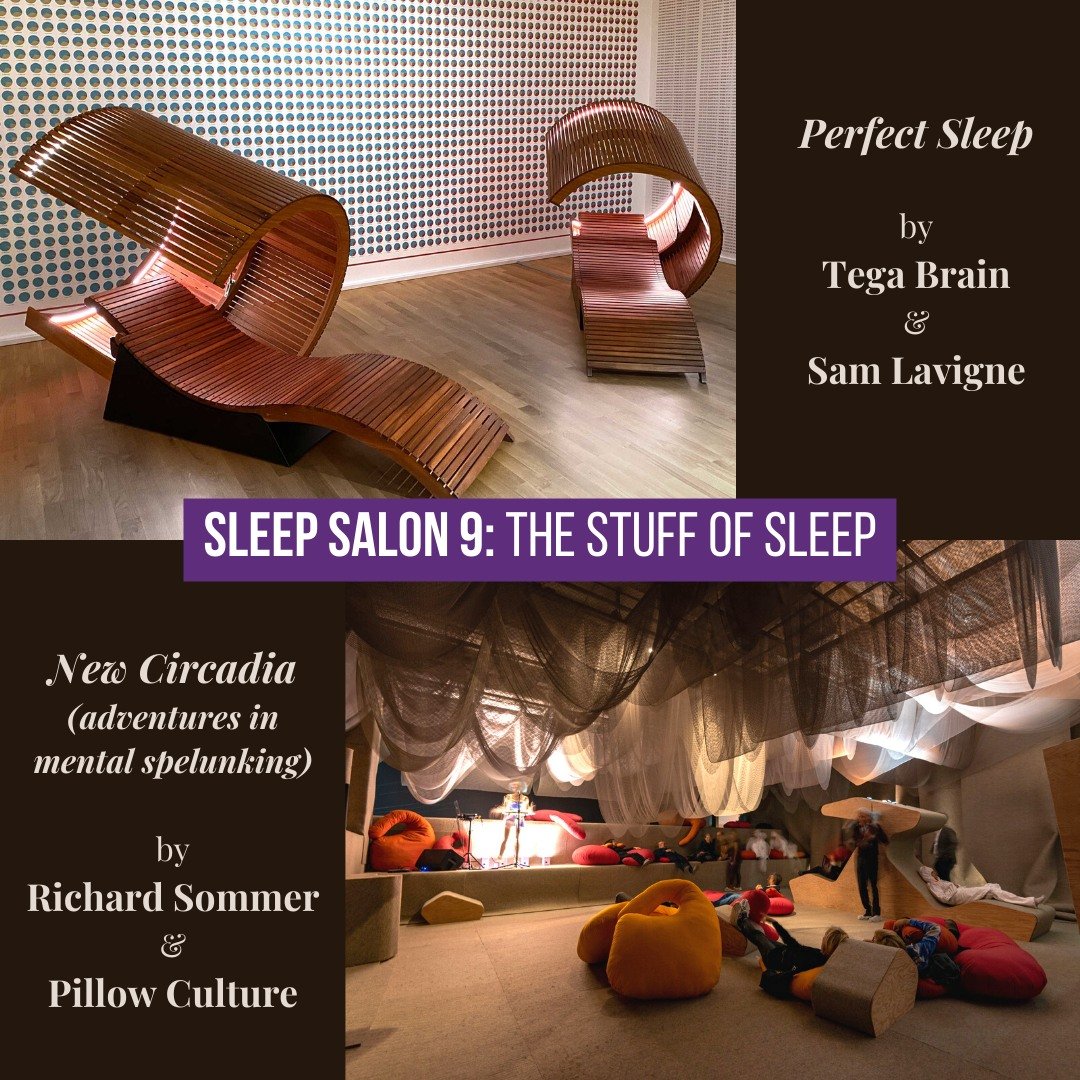
Sleep Salon #9: "The Stuff of Sleep"
⟡ About our Sleep Salon 9 guest speakers ⟡
► Tega Brain (Assistant Professor of Integrated Digital Media, New York University) is an Australian-born artist and environmental engineer whose work examines issues of ecology, data systems and infrastructure.
► Sam Lavigne (Assistant Professor in the Department of Design at UT Austin) is an artist and educator whose work deals with data, surveillance, cops, natural language processing, and automation.
Their collaboration on Perfect Sleep plays with self-tracking apps and furniture design, linking sleep to climate change, Silicon Valley and The Magic Mountain. On Twitter: @tegabrain / @sam_lavigne
► New Circadia is a collaboration between Richard Sommer (Professor of Architecture, University of Toronto), and Natalie Fizer (Parsons New School) and Emily Stevenson of the design team Pillow Culture.
Their recent co-curated exhibition Adventures in Mental Spelunking was inspired by Nathaniel Kleitman’s sleep experiments in Mammoth Cave, Kentucky to rethink the roles of daydreaming, sleep, and repose in contemporary design and architecture.
► Moderated by Curator and SoS Postdoctoral Fellow Erandy Vergara!
Perfect Sleep: https://perfectsleep.labr.io/
New Circadia: https://www.daniels.utoronto.ca/.../new-circadia...
◈ April 20, 4.30pm - 6pm ET ◈
- Details & free registration -
Eventbrite: https://www.eventbrite.com/e/235667095627
Facebook event: https://fb.me/e/2KNrVNBGx
◈◈◈◈◈⠀
Watch our previous Sleep Salons on YouTube: https://buff.ly/3uJncs4

NOCTURAL MILIEUS: A SOUND DESIGN AND SLEEP WORKSHOP with Devon Bate
Thursday, March 10, 2022
2-4pm EST, on Zoom
This workshop explores the sonic dimension of sleeping spaces using the tools of a sound designer. Through embodied listening practices alongside digital media, we rediscover the shapes and textures of these intimate soundscapes–and the way we negotiate our environment while seeking rest.
Devon Bate is a composer and sound designer, currenlty Research Assistant with the Sociability of Sleep, and an MA student at Concordia University. His creative work explores how listening shapes social space, community and identity, and his academic research focuses on backgroun noise and ambient audiovisual media on popular streaming platforms.

DREAM SCENES: A COMIC AND ZINE WORKSHOP with Jenny Lin
Friday, February 11, 2022
2-4pm EST, on Zoom
In this workshop, I will share some of the dream recall, recording and editing strategies I’ve used when creating my “Pandemic Dreams” comic series, and talk about my interest in writing and drawing about my dreams as a way of navigating the space between documentation and fiction. We will discuss strategies of selection that can be used to distill and convey the feeling and narrative? of a dream; how dream recording can be a meaningful personal exercise; and how it can also be approached as a gesture of sociability, with a reader / viewer in mind.
This workshop will include some hands-on zine-making activities of a few single-sheet structures, as well as short writing and drawing exercises that activate these zine structures into platforms for our dreams.
Participants are welcome to share their own dream writing and comics created during this workshop.
To follow along in the exercises, please have with you:
a dream you remember
6 sheets of paper that are easy to fold by hand (I will be using 8.5 x 11” printer (bond) paper for my demonstrations but you can use other types you might have on hand)
a ruler
scissors or an exacto knife with a surface to cut on (for example, a piece of corrugated cardboard or a self-healing cutting mat)
a pencil
an eraser
Jenny Lin is a visual artist based in Tiohtiá:ke / Mooniyang / Montréal. Working with experimental narrative and autobiographical fiction, primarily in the form of print-based installations, artists’ books and zines, Lin is drawn to the socio-political, accessible and community-based aspects of print and zine-making, self-publishing and self-distribution. Lin uses drawing and text as a way to process life experiences and current events, parsing situations into visual sequences that move through, in particular, discomfort, ambiguity and uncertainty. She has collaborated with Eloisa Aquino as B&D Press, a queer art and micropress project, since 2009. Lin was involved as a core member of Qouleur Qollective, a member of articule’s Fabulous Committee, and cofounded the Queer Print Club at Concordia University where she teaches as a sessional instructor in the Print Media Program Area.
Somnambulations Graduate Colloquium
Somnambulations:
New Directions in Interdisciplinary Approaches to Sleep
A Graduate Colloquium organized by The Sociability of Sleep
January, 28 | 9.30am – 5pm EST | On Zoom
Registration: https://www.eventbrite.com/e/237871268367
Somnambulations: New Directions in Interdisciplinary Approaches to Sleep is a full-day colloquium featuring graduate students and emerging scholars addressing sleep from a variety of disciplinary contexts. It embodies the critical and creative sociocultural approach to sleep and sleep science that is fundamental to the Sociability of Sleep project.
⯁ Welcome and opening remarks (9:30am)
Aleksandra Kaminska (Communication, Université de Montréal) and Alanna Thain (English, McGill University)
⯁ Panel 1 (9:30am-10:20am) Sleeping Soundly
Devon Bate (Media Studies, Concordia University)
“Spectacular Rest: How to Sleep in the Attention Economy”
Josh Dittrich (Communication, Culture & Technology, University of Toronto)
“Counting Sheep Beats: Toward a Sonic Materialism of Sleep”
Moderator: Aleksandra Kaminska (Communication, Université de Montréal)
⯁ Panel 2 (10:30am-11:20am) Sleep’s Creative Thresholds
Cedric Kayser (French Language and Literature, Université de Montréal)
“Bodily Atmospheres: The Impact of Ambient Music on the First Stage of Sleep (N1)”
Sandra Huber (Interdisciplinary Humanities, Concordia University)
“SleepWriter: Composing the Electricity of Sleep”
Moderator: Josh Dittrich
⯁ Panel 3 (11:30am-1:00pm) Critiquing Norms in Sleep and Sleep Research
Ryan Staples (Humanities, York University)
“To Whom Does the Dream Belong? Negotiating Expertise in the Early History of the International Association for the Study of Dreams (IASD)”
Josianne Barrette-Moran (Bioethics, McGill University)
“Let the Night Owls In: A Patient-as-Partner Approach to Actualizing Sleep Assessment Tools”
Kristie Serota (Public Health, University of Toronto)
“Unstitching the Sleep Industrial Complex: Reflections on the Medicalization and Commodification of Sleep”
Moderator: Elizaveta Solomonova (Psychiatry, McGill University)
⯁ BREAK (1:00pm-2:15pm)
⯁ Panel 4 (2:15pm-3:45pm) Arts of Rest and Resistance
Josie Roland Hodson (African American Studies and History of Art, Yale University)
“Rest Notes: On Sleep and Black Contemporary Art”
Stacey Cann (Art Education, Concordia University)
“Rest, Slowness, and the Morality of Labour”
Victoria Stanton (Art Education, Concordia University)
“Modeling Rest, Cuing Recovery: On Activating (Doing) Nothing in the Revitalized Third Place”
Moderator: Natalie Doonan (Communication, Université de Montréal)
⯁ Performance (4pm) Bureau of Noncompetitive Research
Steeped In
Introduced by Josh Dittrich
*******************
Somnambulations is organized by Aleksandra Kaminska (Associate Professor, Université de Montréal), Alanna Thain (Associate Professor, McGill University), Josh Dittrich (UofT), and Erandy Vergara (Postdoctoral Fellow, Sociability of Sleep).
The Sociability of Sleep is two-year research program supported by the Government of Canada’s New Frontiers in Research Fund (NFRF) that explores both everyday and exceptional experiences of sleep and its disturbances. The Colloquium is also supported by a bursary from the Canadian Communication Association.
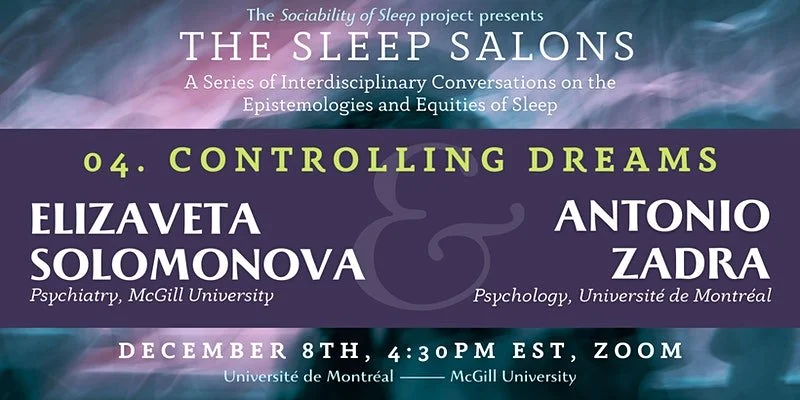
Sleep Salon 4: Controlling Dreams, w A. Zadra and E. Solomonova
Speakers:
Antonio Zadra (Psychology, Université de Montréal)
Elizaveta Solomonova (Psychiatry, McGill University)
Is it possible to control dreams through lucid dreaming states? Do dreams control us in the form of nightmares and other disturbances along the sleep/wake threshold? The act of dreaming and the research on dreams raise profound questions about the modes of agency, (inter)subjectivity and experience that we inhabit through sleep. This Salon brings together dream researchers from the team at the Sociability of Sleep to discuss the philosophical and social questions raised at the margins of the dream world.
✦ Antonio Zadra is Professor of Psychology at the Université de Montréal, where he is a researcher at the Center for Advanced Research in Sleep Medicine. Having published extensively on dreams and parasomnias in both scientific and popular literature, he is most recently co-author of When Brains Dream: The Science and Mystery of Sleep.
✦ Elizaveta Solomonova is a postdoctoral fellow in Psychiatry at McGill University and member of the Culture, Mind and Brain research group. Her interdisciplinary work considers consciousness and experience across wake-sleep states, with an interest in dreaming, empathy and intersubjectivity. Her recent work includes the impact of the COVID pandemic on sleep.
Moderator Claudia Picard-Deland is a PhD candidate in Neuroscience at the Université de Montréal, working in the Sleep and Nightmare Lab at Montréal’s Sacré-Coeur Hospital. Her research interests include dreaming and memory consolidation; nightmares; sleep during the pandemic; and the effects of VR simulation on dreaming.
_____
The Sleep Salons are curated by Josh Dittrich (Postdoctoral Fellow, Université de Montréal), Aleksandra Kaminska (Associate Professor, Université de Montréal), and Alanna Thain (Associate Professor, McGill University). They are part of a year-long series:
Salon 1: The Social Lives of Sleep, ft. M. Wolf-Meyer & C. Alcántara: September 29
Salon 2: The Future of (the History of) Sleep, ft. K. Kroker & B. Reiss: October 13
Salon 3: Traumatic Sleep, ft. F. Nudelman & J. Blanc: November 17
Salon 4: Controlling Dreams, ft. A. Zadra & E. Solomonava: December 8
The Sociability of Sleep is two-year research program that explores both everyday and exceptional experiences of sleep and its disturbances. Launching our programming this Fall are the Sleep Salons, monthly public sessions featuring scholars, artists, and researchers on sleep, showcasing innovative research though conversations that examine how we learn and know about sleep, and that question and expand the methodologies, epistemologies, and equities of sleep knowledge. Exploring the value of sleep research in art and design, humanities, and social sciences, and taking experiential, experimental, critical, and sociable approaches to sleep, each monthly Salon pairs short talks (ca. 25 minutes) from two featured speakers to generate interdisciplinary insights in the ensuing discussion about the sociability of sleep.
The Sociability of Sleep and its Sleep Salons are supported by funding from the Government of Canada’s New Frontiers in Research Fund (NFRF).
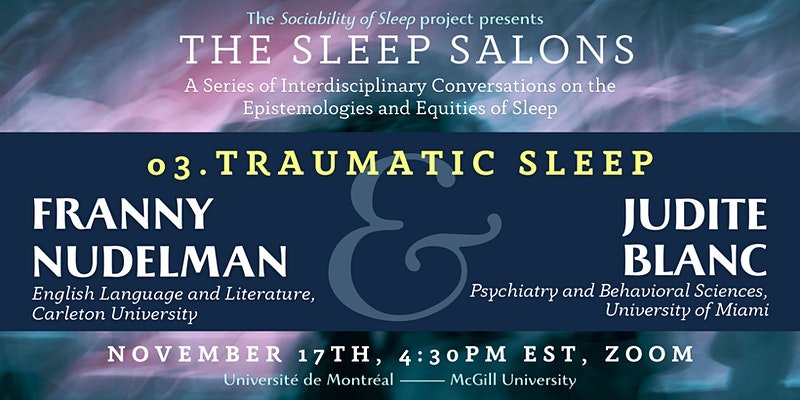
Sleep Salon 3: Traumatic Sleep, with Franny Nudelman and Judite Blanc
Speakers
Franny Nudelman (English, Carleton University)
Judite Blanc (Psychiatry and Behavioral Sciences, University of Miami)
How does the sleep of individuals and populations register traumatic experiences and events, from war to natural disasters? How has sleep served to shape our understanding, treatment and experience of trauma? For our featured speakers, the question remains how sleep might also serve as an expression of resilience and resistance to the traumas it enfolds.
✦ Franny Nudelman is Professor of English at Carleton University, focusing on war in 19th and 20th century US culture. Her recent book Fighting Sleep: The War for the Mind and the US Military looks critically at military-scientific interventions into the troubled sleep of US combat veterans, as well the efforts of a group of Vietnam veterans to transform sleep into a form of antiwar protest.
✦ Judite Blanc is Assistant Professor of Psychiatry and Behavioral Science at the Miller School of Medicine of the University of Miami, having just completed a postdoctoral fellowship at New York University School of Medicine’s Center for Healthful Behavioral Change. Her research examines the impact of traumatic and chronic stress on sleep and health outcomes, tackling racial/ethnic and gender disparities locally, nationally, and globally.
Moderated by Alanna Thain, Associate Professor of English at McGill University, director of the Moving Image Research Lab and the research team CORERISC (Epistemologies of Embodied Risk) and former director of the Institute for Gender, Sexuality and Feminist Studies. As a co-applicant for the Sociability of Sleep project, she is interested in exploring sleep’s intimate opacities, when we become other to ourselves. Her work explores sleep’s relation to radical forms of care and relationality in queer and feminist cinema and performance and in relation to urban ecologies.
_____
The Sleep Salons are curated by Josh Dittrich (Postdoctoral Fellow, Université de Montréal), Aleksandra Kaminska (Associate Professor, Université de Montréal), and Alanna Thain (Associate Professor, McGill University). They are part of a year-long series:
Salon 1: The Social Lives of Sleep, ft. M. Wolf-Meyer & C. Alcántara: September 29
Salon 2: The Future of (the History of) Sleep, ft. K. Kroker & B. Reiss: October 13
Salon 3: Traumatic Sleep, ft. F. Nudelman & J. Blanc: November 17
Salon 4: Controlling Dreams, ft. A. Zadra & E. Solomonava: December 8
The Sociability of Sleep is two-year research program that explores both everyday and exceptional experiences of sleep and its disturbances. Launching our programming this Fall are the Sleep Salons, monthly public sessions featuring scholars, artists, and researchers on sleep, showcasing innovative research though conversations that examine how we learn and know about sleep, and that question and expand the methodologies, epistemologies, and equities of sleep knowledge. Exploring the value of sleep research in art and design, humanities, and social sciences, and taking experiential, experimental, critical, and sociable approaches to sleep, each monthly Salon pairs short talks (ca. 25 minutes) from two featured speakers to generate interdisciplinary insights in the ensuing discussion about the sociability of sleep.
The Sociability of Sleep and its Sleep Salons are supported by funding from the Government of Canada’s New Frontiers in Research Fund (NFRF).
Sleep Salon 2: The Future of (the History of) Sleep w/ K Kroker and B Reiss
What can we learn about the future of sleep by studying its histories? Part of the Sleep Salons: A Series of Interdisciplinary Conversations
Speakers:
Kenton Kroker (Social Science, York University)
Benjamin Reiss (English, Emory University)
What can we learn about the future of sleep by studying its cultural, imaginative and scientific histories? Despite its status as non-experience, sleep has evolved into a perennial subject of cultural conversation, as well as a rigorously scrutinized object of scientific inquiry. How does tracing the often wayward and neglected histories of sleep enable us to think about where sleep is headed in the 21st century?
✦ Benjamin Reiss is Samuel Candler Dobbs Professor and Chair of English at Emory University. His book Wild Nights: How Taming Sleep Created Our Restless World uses literary history and cultural analysis to contextualize and critique the norms and pressures that every sleeper struggles to accommodate.
✦ Kenton Kroker is Associate Professor of Social Science at York University, where he is affiliated with the Health & Society program. His book The Sleep of Others and the Transformations of Sleep Research traces the evolution of the modern sleep laboratory and considers the technological and biopolitical forces that have contributed to the contemporary biomedicalization of sleep.
Moderated by Josh Dittrich, Postdoctoral Fellow with the Sociability of Sleep project. He writes about sound, media and environment and is currently pursing two projects: a book manuscript on the planetary scaling of sound and listening titled Geosonics, as well as a new project on “so(m)niferous media” that attends to the ways sleepers sonically (re)mediate their environments and experiences.
_____
The Sleep Salons are curated by Josh Dittrich (Postdoctoral Fellow, Université de Montréal), Aleksandra Kaminska (Associate Professor, Université de Montréal), and Alanna Thain (Associate Professor, McGill University). They are part of a year-long series:
Salon 1: The Social Lives of Sleep, ft. M. Wolf-Meyer & C. Alcántara: September 29
Salon 2: The Future of (the History of) Sleep, ft. K. Kroker & B. Reiss: October 13
Salon 3: Traumatic Sleep, ft. Franny Nudelman & Judite Blanc: November 17
Salon 4: Controlling Dreams, ft. Antonio Zadra & Elizaveta Solomonava: December 8
The Sociability of Sleep is two-year research program that explores both everyday and exceptional experiences of sleep and its disturbances. Launching our programming this Fall are the Sleep Salons, monthly public sessions featuring scholars, artists, and researchers on sleep, showcasing innovative research though conversations that examine how we learn and know about sleep, and that question and expand the methodologies, epistemologies, and equities of sleep knowledge. Exploring the value of sleep research in art and design, humanities, and social sciences, and taking experiential, experimental, critical, and sociable approaches to sleep, each monthly Salon pairs short talks (ca. 25 minutes) from two featured speakers to generate interdisciplinary insights in the ensuing discussion about the sociability of sleep.
The Sociability of Sleep and its Sleep Salons are supported by funding from the Government of Canada’s New Frontiers in Research Fund (NFRF).

Enervated: Sleep at the Edge of the Social (Panel at SLSA 2021)
Enervated: Sleep at the Edge of the Social
ABSTRACT. Sleep ailments are a chronic condition of the current moment, unevenly distributed across populations and a site of social risk. And yet responsibility for good sleep is reframed as an individual responsibility to manage, and dealing with chronic sleep problems becomes an isolating burden, lived as a private and invisible experience. This is how we have come to commonly think of sleep. But sleep is, insistently, much more social than it might seem. In sleep, we become radically vulnerable in a way that requires social forms of care. Sleep exists at a critical threshold—between public and private, individual and collective, body and environment—that allows us to reimagine novel social relations of collective care. This panel explores a sleeper subjectivity-- the quotidian ways we navigate time, space, ourselves, and others—in relation to the contemporary crisis of enervated rest. Across sites of sleep—performance, media, design and tech-- we search for the edges of sleep’s sociability as a means to undoing exhaustion and to rework affects of distress, terror, discomfort into more sustainable forms.
Sleep Salon #1 The Social Lives of Sleep, with M. Wolf-Meyer & C. Alcántara
Speakers:
Matthew Wolf-Meyer (Anthropology, Binghamton University)
Carmela Alcántara (Social Work, Columbia University)
How and why should we conceive of sleep in social terms? Sleep appears to be a way that the body leaves behind the social world for an inner and highly individualized landscape. Yet much sleep research has also attended to the ways sleep reinforces the social, political, and environmental forces that govern our waking lives.
Here we invite two distinguished researchers to share how their research approaches the social and collective dimensions of a seemingly singular experience.
How might we begin to think the sociability of sleep?
✦ Matthew Wolf-Meyer is Associate Professor of Anthropology at Binghamton University. His book The Slumbering Masses: Sleep Medicine, and Modern American Life uses ethnographic and archival materials to explore the history of sleep and sleeplessness in 20th century American life against the backdrops of modern medicine and industrial capitalism.
✦ Carmela Alcántara is Associate Professor of Social Work and Associate Dean for Doctoral Education at Columbia University’s School of Social Work, where she also directs the Sleep, Mind and Health Research Program. Her work, which integrates psychology, social work, public health and medicine, seeks to advance health equity by understanding how discrimination and other stressors affect sleep and mental health.
Moderated by Alanna Thain, Associate Professor of English at McGill University, director of the Moving Image Research Lab and the research team CORERISC (Epistemologies of Embodied Risk) and former director of the Institute for Gender, Sexuality and Feminist Studies. As a co-applicant for the Sociability of Sleep project, she is interested in exploring sleep’s intimate opacities, when we become other to ourselves. Her work explores sleep’s relation to radical forms of care and relationality in queer and feminist cinema and performance and in relation to urban ecologies.
_____
The Sleep Salons are curated by Josh Dittrich (Postdoctoral Fellow, Université de Montréal), Aleksandra Kaminska (Associate Professor, Université de Montréal), and Alanna Thain (Associate Professor, McGill University). They are part of a year-long series:
Salon 1: The Social Lives of Sleep, ft. M. Wolf-Meyer & C. Alcántara: September 29
Salon 2: The Future of (the History of) Sleep, ft. K. Kroker & B. Reiss: October 13
Salon 3: Traumatic Sleep, ft. Franny Nudelman & Judite Blanc: November 17
Salon 4: Controlling Dreams, ft. Antonio Zadra & Elizaveta Solomonava: December 8
The Sociability of Sleep is two-year research program that explores both everyday and exceptional experiences of sleep and its disturbances. Launching our programming this Fall are the Sleep Salons, monthly public sessions featuring scholars, artists, and researchers on sleep, showcasing innovative research though conversations that examine how we learn and know about sleep, and that question and expand the methodologies, epistemologies, and equities of sleep knowledge. Exploring the value of sleep research in art and design, humanities, and social sciences, and taking experiential, experimental, critical, and sociable approaches to sleep, each monthly Salon pairs short talks (ca. 25 minutes) from two featured speakers to generate interdisciplinary insights in the ensuing discussion about the sociability of sleep.
The Sociability of Sleep and its Sleep Salons are supported by funding from the Government of Canada’s New Frontiers in Research Fund (NFRF).

Panel at Fear 2000 Conference: Horror Unbound
Panel 10b – Night Terrors: Sleep Horror
Chair: Aleksandra Kaminska
Evil Nightmares
(Lynn Kozak, McGill University)Sleeping for Audiences and the Terror that it Brings
(Dayna McLeod, McGill University)Dark Times: Feminist Sleep Thrillers and the Labour of Being a Body
(Alanna Thain, McGill University)
Hosted by staff in the Department of Media Arts and Communication at Sheffield Hallam University, this online conference will investigate the increasingly transmedial nature of horror in the twenty-first century.
Established in 2016, Fear 2000 is dedicated to championing work on contemporary horror. Previous events have showcased research from established scholars, early-career researchers and postgraduates focused on cinema, television, animation, video games, music and digital literature. But this has provided only a limited sense of horror's increasing presence in all aspects of popular culture; for our fifth conference, we aim to broaden our scope further and encourage papers that discuss and theorise horror across a wide range of media, including (but not limited to) film, television, theatre, performance, animation, art, photography, music, radio, podcasts, video games, digital media, comic books and literature.

